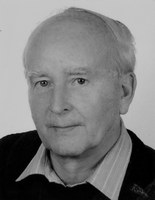Orbituary for Professor Dr. Bodo Baschek (1935 - 2022)
by Björn Malte Schäfer und Immo Appenzeller, Heidelberg University
The Heidelberg astronomer Bodo Baschek died on the 17. August 2022 at the age of 87.
Bodo Baschek studied physics and mathematics at Kiel University and graduated at the Albrecht Unsöld's institute on a topic which should lead him soon to his own scientific specialisation: the spectra analysis of extremely metal-poor stars, which provided support for the then newly developed theory of primordial nucleosynthesis, put forward by Burbidge, Burbidge, Fowler and Hoyle. After postdoctoral stays at Pasadena and Canberra he came to Heidelberg in 1969, where he worked until his retirement in 2001 as Ordinarius at the Institut für Theoretische Astrophysik, only interrupted by long-term research visits at Haifa and Lund.
Bodo Bascheks area of expertise was the physics of stellar atmospheres: He developed analytical and numerical methods for the description of radiative transport in stars, where he witnessed the rapid advancement in the technology of computing, from purely mechanical calculators to electro-mechanical and finally electronic computers. One of his central scientific achievements were models of radiative transports in moving media, the precise determination of chemical abundances in stellar atmospheres and the derivation of the spatial distribution of chemical elements in galaxies, including our Milky Way.
Bodo Baschek's name is known to generations of astronomy students because of the book "The New Cosmos", where he took over the responsibility of authorship from his mentor Albrecht Unsöld. He extended the scope of the book to a universal textbook for observational and theoretical astrophysics, which is currently continued by Wolfgang Duschl. Professor Baschek's fascination for astronomy could be experienced in his lectures, in which he explained physical models in all clarity and deducted them from fundamental physical principles.
The minor planet 78429, which as discovered in 2002 by the Heidelberg-based astronomer S.F. Hönig at the Palomar-Observatory, carries Baschek's name, in recognition of the academic achievements of Bodo Baschek in relation to the understanding of stellar atmospheres, processes of radiative transport and stellar spectra as diagnostic tools.
The Astronomische Gesellschaft will keep a fond and respectful memory of the person and the scientific achievements of Bodo Baschek: He was an exceptional teacher for astronomy, a kind and conscientious supervisor, a leading scientist and a universally educated person.
Photo above right: Bodo Baschek, with kind permission of the Baschek family



